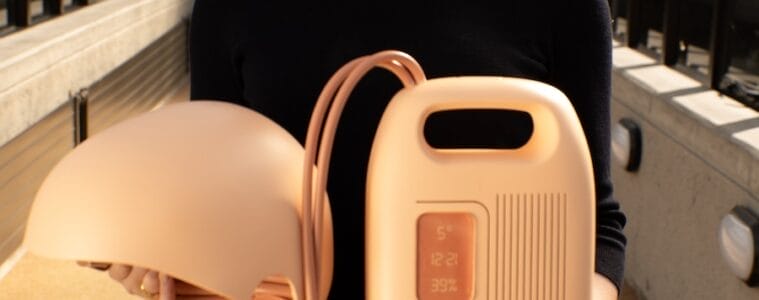
Limerick woman Olivia Humphreys (24) witnessed how upsetting it is for patients who face losing their hair during chemotherapy when her mother went through it in 2019.
65-99% of patients going through chemotherapy will be affected by hair loss. Scalp cooling can help prevent this by shrinking the blood vessels and is done by applying cold temperatures to the scalp during chemotherapy treatment. Scalp cooling is intended to help prevent hair loss, known as chemotherapy-induced alopecia, for people undergoing chemotherapy. It works by limiting blood flow to the scalp. This can reduce the amount of the chemo treatment that reaches your head, protecting your hair follicles from the chemo drugs.
Olivia noticed the shortage of scalp-cooling machines aimed to minimise hair loss in the hospital her mother was in, as well as how limited the existing solutions were.
Current products require the patient to arrive 30 minutes early and stay for 90 minutes after infusion for pre and post scalp cooling. With Athena, patients can manage this aspect of treatment themselves and seamlessly integrate into an infusion appointment with no extra time or attention required, using this device from the comfort of their own homes.
The Problem:
Current chemotherapy scalp cooling devices are either heavy duty hospital-only machines which cannot be moved easily and require patients to sit in a ward for long periods of time.
On the other hand, there are cheaper, manual cooling alternatives available used to cool the heads of chemo patients to prevent hair loss, yet these prove to be less powerful, ineffective and they don’t last long enough for maximum benefit. Athena aims to offer an effective hospital standard device that gives control to a patient in a time of little control.
The Invention:
Having, witnessed firsthand how much of an impact chemotherapy induced hair loss can have on a person, when her mother was sadly affected by cancer in 2019 and from spending time with her during treatment, Olivia Humphreys was inspired to reimagine the way scalp-cooling can be done.
How does it work?
Athena works by utilising low-cost thermoelectric semiconductors called peltiers, and these cool a tank of water, which circulates the cold water around the head with the smartly designed headpiece. The battery powered device allows patients to bring the device home and control it themselves, making it more accessible to the consumer market.
The estimated cost for Athena would be around €1000, according to Olivia Humphreys, compared to industry machines which come in at around €40,000 or more. Weighing around 3kg, Athena is more portable than the current leading products on the market, which use refrigeration technology requiring constant plugged in power. Athena, at full battery power, can run for 3.5 hours, allowing the patient to commute to and from the hospital while cooling and move around during infusion for bathroom visits, etc.
Speaking about Athena, Olivia Humphreys said: “I decided to build a working prototype to test the capabilities of the Peltier semiconductors. Using a Peltier computer cooling fan system, a diaphragm pump, my mum’s old suitcase, and my dad’s plane battery,
“I was able to create a strong proof of concept to gather valuable feedback to develop the concept. Following this, I focused on the product’s form, creating cardboard and foam models and determining functionality aspects and touch points to ensure the best user experience. Ultimately, I arrived at my final model, Athena, which was crafted using SolidWorks 3D CAD modelling.”
The future of Athena:
Speaking about what is next for this invention, Olivia says: “To elevate Athena to the next level, extensive research and development is required. While working on this project, I have been fortunate to network with Luminate Medical, a company in Galway, Ireland, dedicated to building a better future for cancer care. They have extended an internship offer to me as a research and development engineer. I have accepted and am very eager to apply the insights gained from my own research and development to contribute to their mission.”
Speaking about Athena, Lead Design Engineer at Dyson, James Gilchrist who was part of the judging panel, said: “Hair is a deeply rooted symbol of our identity. Losing it can be one of the most difficult side effects of chemotherapy. Currently, only 8 of Ireland’s 26 hospitals offer scalp cooling as a treatment, partly due to the expense of the equipment and the additional time required to deliver the treatment.
The genius of Athena isn’t just in increasing access; it’s in taking the patient out of the clinic. Instead of spending an extra two hours in the treatment centre, Athena allows patients to pre cool their scalp on the way there and continue the cooling process post-treatment in the comfort of their own home. That’s not just a win for patients but also for clinics, enabling them to treat more patients each day.
Olivia impressed us with her first prototype—a ‘cut and shut’ computer cooling fan and diaphragm pump built into her mum’s old suitcase. Once that proved the concept, she went on to develop a high-fidelity prototype, leveraging recent innovations in battery-powered coolers.”
Olivia is eager to see how her work can inspire further innovation in cancer treatment and patient care and continue contributing to advancements in the industry.
Athena will now progress to the international stage of the James Dyson Award and Olivia will aim to commercialise this product by producing a fully functional, technologically integrated prototype.
See more stories here.














